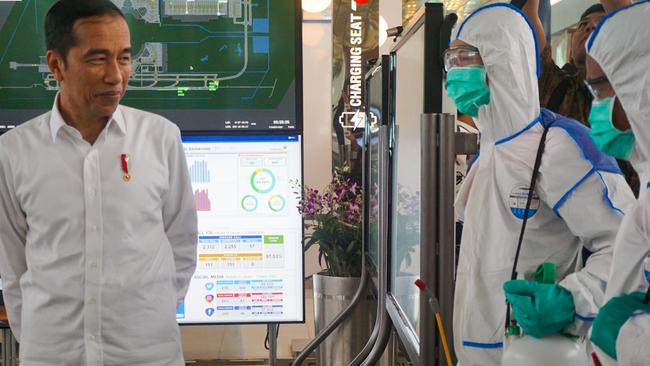Coronavirus: Jokowi on back foot as cases escalate
Joko Widodo defends his government against claims it has shifted its COVID-19 focus from health to economic recovery.

Indonesian President Joko Widodo has defended his government against claims it has shifted its COVID-19 focus from health to economic recovery, as the country experiences a rapid escalation in infections that has pushed its caseload past 100,000.
Mr Joko said on Monday that a new committee formed to tackle the coronavirus would “integrate health and economic policies so there is balance between the gas and brakes”.
“Managing health is the priority, we cannot forget this,” he said. “The sense of health crisis must continue until there is a vaccine later that can be used effectively. There is no disbanding of the COVID-19 taskforce — not in the centre nor in the regions.”
Jokowi, as he is known, said the committee’s role would be to focus on reducing mortality rates, increase recovery rates and stop the disease’s spread in the eight provinces — Jakarta, Papua, Central, East and West Java, North and South Sumatra and South Kalimantan — where three quarters of the country’s cases had been confirmed.
But he also demanded a more effective absorption of the government’s 695 trillion rupiah ($67bn) economic stimulus package, of which only 19 per cent had so far been distributed.
The government has been roundly criticised for dissolving the National COVID-19 Mitigation Taskforce last week, which included experts from the health ministry and World Health Organisation.
In its place is a team, co-chaired by its economics minister and minister for state-owned enterprises, which has been charged with tackling both the public health and economic aspects of the pandemic.
Yet Indonesia is pushing ahead with plans to reopen its economy — including reopening Bali’s borders to domestic tourism on July 31 and to international visitors on September 11 — despite the fact the country will have almost doubled its official caseload by the end of July.
From 56,385 cases on June 30, the country has since confirmed an average of more than 1600 new cases each day and on Monday registered a caseload of 100,303 and 4838 deaths.
The country of 270 million people has been gradually ramping up testing but its rates are still very low, with an average 2.91 people out of every 1000 tested daily according to the Our World in Data site, compared to Australia’s 143.16, Malaysia’s 28.81 and even impoverished Bangladesh’s 6.55
Indonesian Medical Association spokesman Halik Malik said the President, and not economics ministers, should be chairing the COVID-19 committee with health authorities and experts.
“The government is too focused on some perceived threat to political and economic stability as a result of the pandemic, so all of its efforts have been focused on reducing panic among the public,” Dr Halik told The Australian. “The fact is that COVID-19 is still spreading and has reached all regions. Meanwhile, the government is rolling out policies and making statements that seem anti-science and downplay the virus. Public health recovery is the only way towards economic recovery.”
Among the more brazen “anti-science” statements was the Health Minister’s suggestion that people should pray to ward off the disease, and the Agriculture Minister’s claims this month that a necklace made from eucalyptus, if worn for 30 minutes, could help the virus.
University of Indonesia epidemiologist Pandu Riono was also scathing of the new committee which he said was little more than wallpaper designed to show the government was doing something. “What is the purpose of the committee? The work, the job description for them is what they are supposed to be doing anyway,” Dr Pandu said.
“There are no changes, no innovation, no breakthroughs with the formation of this committee. If anything, it makes things more unclear. I’m afraid public health has never and will never be a priority for the government. The focus has always been the economy and because of that, there are no focused efforts to handle the pandemic.”



To join the conversation, please log in. Don't have an account? Register
Join the conversation, you are commenting as Logout